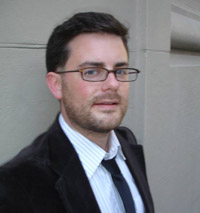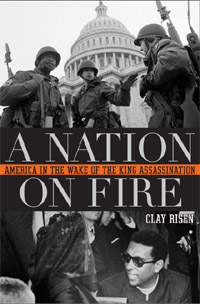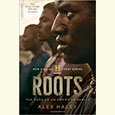After Memphis
Journalist Clay Risen looks at the legacy of King assassination, then and now
Clay Risen’s A Nation on Fire: America in the Wake of the King Assassination offers a detailed examination of the riots that ravaged U.S. cities after Martin Luther King Jr.’s murder in April 1968. Drawing on a rich array of sources, including firsthand recollections, Risen depicts a country that was not united in mourning, but divided by rage and fear. A moment-by-moment account of the chaos in the streets is accompanied by a surprising look inside the Johnson White House, where alarm about the civil unrest was accompanied by bitterness over the apparent failure of liberal policies. These two perspectives combine to show that the riots, he writes, were “the violent collision of so many trends, subtle and not so subtle, working their way up through the national psyche.”
Risen was not yet born when the riots occurred, but his interest in them is personal as well as professional. His mother was an office worker in Washington, D.C. at the time, one of the many ordinary people who rushed to escape the city as the violence spread. His father, serving in the Army, was sent to protect a munitions factory outside Chicago from rioters.
 Risen, a longtime Nashvillian and graduate of Montgomery Bell Academy, is a former editor at The New Republic. Today he lives in Washington, D.C., where he is the managing editor of Democracy: A Journal of Ideas.
Risen, a longtime Nashvillian and graduate of Montgomery Bell Academy, is a former editor at The New Republic. Today he lives in Washington, D.C., where he is the managing editor of Democracy: A Journal of Ideas.
Chapter 16: In the book’s introduction you talk about your parents’ experience with the riots. Were there other inspirations?
Risen: Well, it was living in Chicago, and living in Washington in the 90s and [again] after 2003, and seeing how the cities were rapidly filling in where there had been a lot of rioting. I felt like this is a story that I can see being written over in almost my daily life. I can go out and see new buildings rising, and people who lived through that, who embody the living memory of it, getting older and passing on. This is an event that could very well fall through the cracks and be known only in vague outline: “Yes there was a violent reaction to King’s assassination, yes there was a political element going on, but we don’t really have much memory of that.”
Chapter 16: Do you think there are potential pitfalls to writing about history with which you have a personal connection?
Risen: I saw [my parents’] stories as very typical of what was going on. Since I’ve done the book I’ve met a lot of people who say, “I was based here in the U.S. in the Army. I had a very similar experience to your father.” Other people say, “I was in Washington; I was one of the hundreds of thousands of people trying to flee the city.” It wasn’t at all that my parents were speaking to some kind of unique experience that I had inherited, but rather that they were giving me access—not to a universal story—but to a very common story.
There is of course a pitfall of over-personalizing a story, or using that as the basis for the presentation of an objective history. At the same time, I think there’s a lot to be said for using a family history to plumb the matter, as long as you’re honest about what you’re presenting. If it ends up being a memoir or a personal history or a family history, you need to say in the beginning, “Here’s why I’m writing this; here’s what gave me the inspiration; here’s how I relate to this story.” As long as you’re straightforward, I don’t think there’s a lot of risk.
Chapter 16: Did you discover anything in the course of your research that was at odds with the idea you had about the riots going in?
Risen: I certainly developed ideas, and they were changed and challenged by what I was finding, but I think that’s par for the course with any historical work. There certainly wasn’t something that made me completely rethink what I was doing. What was going on in the White House proved to be much more interesting than I originally thought. I thought it would be a fairly conventional story, and in fact it tied very much into Lyndon Johnson’s personal tragedy—that it came so soon after his decision to withdraw from the race. What he thought about King and King’s assassination—this all became a very interesting part of the story that I hadn’t really foreseen.
Chapter 16: Were you surprised by how much Johnson seemed to see the riots as a personal betrayal, or a rebuke to what he believed?
Risen: It was surprising at first, but the more I learned about Johnson, it makes perfect sense. Politics was personal for him. He was only a political animal; there was no other side to him. Most politicians are like that to some extent, but it was surprising to see how viscerally he reacted. This was a man who had grown up his entire political career with a New Deal worldview, a liberal-state worldview, and he literally saw it falling apart under his watch—not exclusively, but in part because of things he did. So I think it would be hard for him not to take it a little personally.
Chapter 16: Which things specifically did he do that caused it to fall apart?
Risen: Vietnam, for one. I don’t think he made a lot of mistakes in regard to race relations. The mistake he made was in thinking that simply by bringing political pressure on someone like Martin Luther King, or some of the other leaders, that he could control the movement. And that was not at all the case. He could help the movement, and the movement could certainly help him, but it was not something that could be contained.
Even after the majority of the country committed itself to a more or less equal society, there was no effort on the part of, let’s say, white Northern mayors to bring about equality.
When the younger generation of more radical leaders came along—Stokely Carmichael, the SNCC leaders of the 60s—he didn’t understand them at all. For him, not only was the movement not going the way he wanted it to, but it was morphing, I guess, and in a way it was expressing something that had always been there. Radicalism was always an element of the civil rights movement. Even before the civil rights movement, part of the black push for equality had a militant edge. It was simply that in the mid-60s certain people and certain events coincided with media attention to make it seem that, “Oh wow, there are militants where there hadn’t been militants before.”
Johnson didn’t understand any of this, nor did anyone else in the country; but for him, I think, having put so much effort into crafting and believing that he could craft society and the American political scene in a certain way, to see it all falling apart and to see it all land on him—it was almost inevitable that he would take it personally.
Chapter 16: Would you say that the riots exposed a conceptual weakness in old-style liberalism, a sort of blindness?
Risen: Well, yes and no. I think it exposed a weakness in American society. Even after the majority of the country committed itself to a more or less equal society, there was no effort on the part of, let’s say, white Northern mayors to bring about equality. People like Mayor Daley in Chicago were perfectly willing to let the ghettos be the ghettos. I think that’s a function of American society that we had created a long time ago, and, inevitably almost, the vast majority of African Americans who lived in ghettoes were going to start to demand equality and start to demand rapid social change. When the system failed to deliver that, they were going to start to express themselves in other ways, through rioting.
Incarceration rates have gone radically skyward. People are not finding opportunities to move out of the inner city. I think that we as a country have accepted a new kind of segregation.
That said, I think the liberal state, because it promised to change those things, set itself up to fail, because it couldn’t do that. No system could deliver change that rapidly. Yet the liberal state said, “Yes, we can.” That was a pipe dream. I think this may be an exaggeration, but some political scientists who have looked at the Great Society have said that it was only spending, in terms of inner city programs, one percent of what it needed to achieve its goals. [The liberals] promised a lot, they legislated a lot, and then they didn’t deliver. So that sets them up to fail, because inevitably there will be the violence that they were trying to prevent, and when it happens, they’ll be blamed.
Chapter 16: Do you think those kinds of exaggerated expectations are being created now? Or is it a completely different ground we’re working on?
Risen: I think it’s a completely different ground. I think that on the one hand, we haven’t changed very much. We still have statistically the same number of inner-city poor. In Washington we have stagnated since 1968 in terms of job opportunities for inner-city blacks, in terms of educational opportunities. Incarceration rates have gone radically skyward. People are not finding opportunities to move out of the inner city. I think that we as a country have accepted a new kind of segregation. We’ve successfully created a wall around the ghetto. We successfully drew a line around it, so the rest of a metropolis doesn’t depend on it. It can sit there and literally be segregated from the rest of society. A long as it’s policed and controlled—almost in a military style—we don’t have to worry about it.
Chapter 16: Do you think that the tolerance we have for poor conditions in the inner city, and for that military-style policing, was fostered by the law and order backlash that you talk about in A Nation on Fire? Do you think the white public was indoctrinated with the idea that “We’re going to save you from those people”?
 Risen: I do, and I think racism is a little bit like water. It takes many different forms. You try to push it down in one place, and it will come up in another. It’s going to find new ways of expression. It’s difficult to talk about the racism of Jim Crow and the racism of urban segregation today in the same sentence. They’re obviously related and have the same historical roots, but their expression is so different. Today I think we’ve managed to turn it into a class issue, to mask it as a class issue. If there’s a poor section of town, that’s their fault. It’s not the fault of the system. That allows us to ignore the fact that the poor section of town is also the black section of town. These things are related questions. It’s not possible to ignore one and look at the other. So we still have a lot of work to do as a country to ask ourselves why it is the case, and it’s an incredibly difficult question.
Risen: I do, and I think racism is a little bit like water. It takes many different forms. You try to push it down in one place, and it will come up in another. It’s going to find new ways of expression. It’s difficult to talk about the racism of Jim Crow and the racism of urban segregation today in the same sentence. They’re obviously related and have the same historical roots, but their expression is so different. Today I think we’ve managed to turn it into a class issue, to mask it as a class issue. If there’s a poor section of town, that’s their fault. It’s not the fault of the system. That allows us to ignore the fact that the poor section of town is also the black section of town. These things are related questions. It’s not possible to ignore one and look at the other. So we still have a lot of work to do as a country to ask ourselves why it is the case, and it’s an incredibly difficult question.
Chapter 16: Getting back to the book, if you’d had the opportunity to talk to Johnson, what would you have asked him?
Risen: If I could talk to Johnson, I would want to know what he thought King’s death meant for the country. I really have no idea, nor did he speak much about it, beyond platitudes. Why did he send his aides scurrying about, building a massive legislative package, in the hours after the assassination, only to grow despondent by the end of the weekend and throw the whole plan in the garbage? Was it an admission of defeat on his part?
Chapter 16: Were there subjects you tried to interview who didn’t want to talk about those days?
Risen: Yes, particularly people who in one way or another were out on the streets those nights. I tracked down a number of people I found in newspaper articles, and while some talked to me, most were, understandably, wary of someone trying to dig up a story that might cast them in a negative light. A few celebrities who were around at the time—Bill Clinton, who was a senior at Georgetown and a relief worker after the riots—were too busy. But I was pleasantly surprised at how many people made time for me.
Chapter 16: As you have traveled around talking about the book, do you find that blacks and whites tend to view the riots differently?
Risen: Yes, there is still very much a division of opinion along racial lines, though mostly among older generations. I was criticized by some whites for being too hard on the white working class, and at other times I was criticized by older blacks for denigrating the violence after King’s death as “riots” when in fact it was a “rebellion” or “revolution.” I suppose getting flak from both sides is proof I did something right.
In general, though, and particularly among younger people, I mostly came across what used to be called the “establishment liberal” perspective: the riots were criminal activities, surely, but they expressed a legitimate frustration with a system that claimed to work on the inner-city poor’s behalf while in reality keeping them down. This is true, I would say, among both liberal and conservative readers—the difference being how they appreciate the rightward turn that followed. Which is not to say that everyone saw the riots as a wholly negative phenomenon. Particularly among black urban readers, there is an appreciation for the grassroots organizing and activist spirit that the riots engendered. They regret the riots, to be sure, but they understand that the results were complex.


